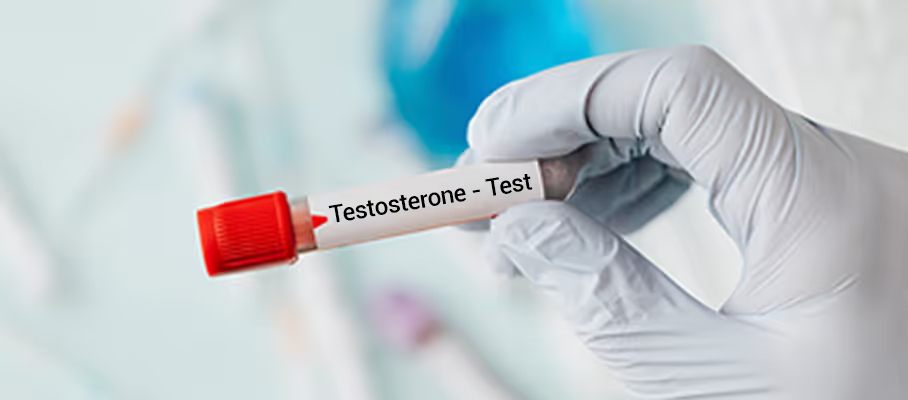Total Testosterone Blood Test
Feeling fatigued, noticing a drop in muscle mass, or experiencing mood swings? These could be signs of low testosterone levels. A Total Testosterone Blood Test is a straightforward way to assess your hormone levels and take proactive steps toward better health. At Everlab, we integrate this test into our comprehensive health assessments, aiming to detect, prevent, and reverse disease risks through personalised, data-driven care.

Testosterone Blood Test In Australia, Get Tested Today
What:
Blood biomarker
Tests for:
Hormonal Balance
Referral:
Required
Member cost:
$60-$90
What Is Total Testosterone?

Total testosterone measures the overall amount of testosterone in your bloodstream, including both bound and unbound forms. In males, testosterone is primarily produced in the testes, while in females, smaller amounts are produced in the ovaries and adrenal glands. The body produces testosterone in response to signals from the brain and other glands. Most testosterone in the blood is attached to proteins, while a smaller portion remains unbound (free). This hormone plays a crucial role in various bodily functions, such as muscle development, bone density, mood regulation, and sexual health. The total testosterone test measures both the protein-bound and free (unbound) testosterone in the bloodstream.
Why Is Testosterone Important?
Testosterone influences numerous aspects of health:
- Muscle and Bone Health: Supports muscle mass and bone density.
- Mood and Energy: Affects mood stability and energy levels.
- Sexual Function: Essential for libido and reproductive health.
- Body Fat Distribution: Helps regulate body fat, with lower testosterone often linked to increased body fat, especially with aging.
- Hair Growth: Influences hair growth, with imbalances potentially leading to hair loss or excess hair growth.
Maintaining optimal testosterone levels is vital for overall well-being.
Why Test Your Testosterone Levels?
Testing your testosterone levels can help:
- Identify Hormonal Imbalances: A testosterone levels test or testosterone level test can detect hormonal imbalances, such as low or high testosterone levels, that may be causing symptoms.
- Guide Treatment Plans: Testing can help diagnose testosterone deficiency and identify a low testosterone level or high or low testosterone, informing decisions on lifestyle changes or medical interventions.
- Monitor Health Progress: Monitoring testosterone levels can help detect underlying health problems and track the effectiveness of treatments or lifestyle modifications.
Regular testing is especially important for men over 40, as testosterone levels naturally decline with age.
Other tests may be recommended alongside testosterone testing for a comprehensive assessment.
Benefits of Testing Your Testosterone Levels
Testing your testosterone levels offers a range of important benefits, especially if you are experiencing symptoms such as low energy, reduced muscle mass, or changes in sex drive. A simple blood test can help uncover abnormal testosterone levels, which may be linked to underlying medical conditions like hypogonadism, pituitary gland disorders, or testicular issues. By identifying these problems early, you can take proactive steps to address health issues such as erectile dysfunction, decreased muscle mass, or low sex drive.
Testosterone testing is also valuable for monitoring the effectiveness of testosterone replacement therapy (TRT), ensuring your hormone levels stay within the normal range and helping to avoid potential side effects of high testosterone. Regular testing can catch abnormal testosterone before it leads to more serious health problems, allowing for timely intervention and treatment. Ultimately, understanding your testosterone levels empowers you to make informed decisions about your health and well-being, whether you are managing a medical condition or simply aiming to optimise your hormone balance.
What Affects Testosterone Levels?
Several factors can influence testosterone levels:
- Age: Testosterone levels decline with age.
- Lifestyle: Poor diet, lack of exercise, and stress can lower testosterone.
- Medical Conditions: Obesity, diabetes, and hormonal disorders may impact levels. Weight gain can also be a result of hormonal imbalances.
- Medications: Certain drugs can affect hormone production.
Other factors, such as genetics and environmental exposures, can also influence testosterone levels.
Understanding these factors can help in managing and optimising testosterone levels.
How to Prepare for a Testosterone Blood Test
To ensure accurate results:
- Timing: Schedule the test in the morning when testosterone levels are highest.
- Fasting: Follow any fasting instructions provided by your healthcare provider.
- Medication Review: Inform your doctor about any medications or supplements you're taking.
Proper preparation helps in obtaining reliable test outcomes.
Getting Tested: How and Where in Australia
In Australia, getting a testosterone test is straightforward and accessible. Most people start by visiting their doctor’s office or a local medical clinic, where a healthcare provider will review your symptoms and medical history to determine if testosterone testing is appropriate. If recommended, the test involves a simple blood draw, which is then sent to a laboratory for analysis.
For those seeking convenience or privacy, some clinics and medical centers now offer at home testosterone tests. These kits allow you to collect a blood sample yourself, following clear instructions, and send it to a lab for professional analysis. Regardless of the method, it’s important that testosterone testing is overseen by a qualified healthcare professional, who can interpret your test results and provide personalised advice on hormone health.
To find a testing facility near you, you can search online for local clinics or ask your healthcare provider for recommendations. Whether you choose in-person or at-home testing, you’ll be taking an important step toward understanding your testosterone levels and overall health.
What to Expect During Your Testosterone Blood Test
A testosterone blood test is a quick and straightforward procedure designed to measure your testosterone levels accurately. When you arrive at the testing facility, a healthcare professional will draw a small blood sample from a vein in your arm, usually using a test tube or vial. The process typically takes less than a minute and may cause only a brief sting or mild discomfort.
Most testosterone blood tests are scheduled in the morning, as testosterone levels are highest at this time of day. Depending on your healthcare provider’s instructions, you may be asked to fast for a few hours before the test to ensure the most accurate results. After your blood draw, you can resume your normal activities right away.
Your blood sample will be sent to a laboratory for analysis, and test results are usually available within a few days. Following the instructions provided by your healthcare provider and the testing facility will help ensure your results are as accurate as possible.
Understanding Your Testosterone Test Results
Normal Ranges
Testosterone levels are measured in nanomoles per litre (nmol/L). Normal ranges can vary, but generally:
- Men: 10–38 nmol/L

- Women: 0.62–1.87 nmol/L

It's important to interpret results in the context of individual health and symptoms.
When to Be Concerned
- Low Levels: May indicate hypogonadism or other health issues.
- High Levels: Could suggest testosterone overproduction or supplementation.
Consult with a healthcare professional to understand the implications of your results.
Risks and Limitations of the Testosterone Test
While the test is generally safe, consider:
- Variability: Testosterone levels can fluctuate due to various factors.
- Comprehensive Assessment: Total testosterone may not provide a complete picture; additional tests like free testosterone and SHBG may be necessary.
Discuss with your doctor whether further testing is appropriate.
Long-Term Health Implications
Abnormal testosterone levels can impact long-term health:
- Low Testosterone: Associated with decreased bone density, muscle mass, and mood disturbances. Testosterone deficiency may require medical intervention to address these symptoms and prevent further health complications.
- High Testosterone: May lead to aggressive behavior, acne, and increased risk of certain health conditions.
Monitoring and managing testosterone levels is crucial for maintaining overall health. For individuals with persistent abnormal testosterone levels, testosterone therapy or hormone therapy may be considered under medical supervision.
Improving Testosterone Levels Naturally
To support healthy testosterone levels:
- Exercise Regularly: Engage in strength training and cardiovascular activities.
- Eat a Balanced Diet: Include foods rich in zinc and vitamin D.
- Manage Stress: Practice relaxation techniques to reduce cortisol levels.
- Sleep Well: Aim for 7–9 hours of quality sleep per night.
Lifestyle modifications can have a significant impact on hormone balance.
Total Testosterone vs. Free Testosterone

- Total Testosterone: A testosterone test measures all testosterone in the blood, including both bound and unbound forms. This includes testosterone that is attached to proteins like sex hormone-binding globulin (SHBG) and albumin, as well as free testosterone.
- Free Testosterone: Measures only unbound testosterone, which is biologically active.
Bioavailable testosterone refers to the fraction of testosterone that is either free or loosely bound to proteins such as albumin, making it readily available for the body's use. Measuring bioavailable testosterone can provide a more accurate assessment of hormonal health.
Assessing both provides a comprehensive view of hormonal health.
When to Re-Test Testosterone Levels
Re-testing may be necessary:
- After Treatment: To monitor the effectiveness of interventions.
- If Symptoms Persist: To reassess hormone levels.
- Routine Monitoring: As advised by your healthcare provider.
Regular testing ensures optimal management of testosterone levels.
Common Questions About Testosterone Testing
Many people have questions about testosterone testing, from what the process involves to how to interpret their test results. Here are some of the most common concerns:
- How do I know if my testosterone levels are low or high? Symptoms of low testosterone may include fatigue, reduced muscle mass, low sex drive, and mood changes. High testosterone can cause symptoms like acne, increased body hair, or mood swings. Only a blood test can confirm abnormal testosterone levels.
- Can I get tested at home, or do I need to visit a clinic? Both options are available. At home testosterone tests offer convenience, while clinic-based tests provide direct access to healthcare professionals for guidance and follow-up.
- How often should I get tested? The frequency of testosterone testing depends on your symptoms, medical history, and whether you are undergoing testosterone replacement therapy. Your doctor can recommend the best schedule for you.
- What are the benefits and risks of testosterone replacement therapy? TRT can help restore normal testosterone levels and relieve symptoms, but it’s important to discuss potential risks and benefits with your healthcare provider to determine if it’s right for you.
If you have concerns about your testosterone level or are experiencing symptoms of abnormal testosterone, consult a qualified healthcare professional. They can help you understand your test results, recommend additional tests if needed, and guide you toward the best treatment options for your hormone health.
Sources
1. Pathology Tests Explained - Testosterone
https://www.pathologytestsexplained.org.au/ptests-pro.php?q=Testosterone
2. Endocrine Society - Testosterone Therapy in Men with Hypogonadism: An Endocrine Society Clinical Practice Guideline (2018)
https://pubmed.ncbi.nlm.nih.gov/29562364/
3. Harvard Health - Testosterone: What is is and how it affects your health
https://www.health.harvard.edu/staying-healthy/testosterone--what-it-does-and-doesnt-do
4. British Medical Journal - Hypogonadism in men
Get On Top Of Your Testosterone Levels
A Total Testosterone Blood Test is a valuable tool in assessing and managing your hormonal health. At Everlab, we incorporate this test into our comprehensive health programs to provide personalised insights and proactive care. Take control of your health today by scheduling a test and consulting with our expert team.
.avif)


imaging

biomarkers

sterols
Book a Free Discovery Call
Join 20,000+ Australians improving their health with proactive, personalised healthcare.